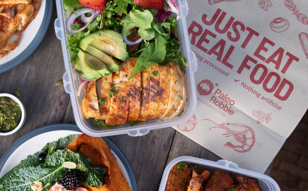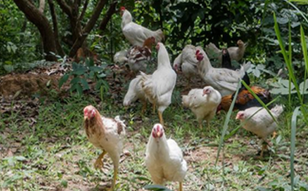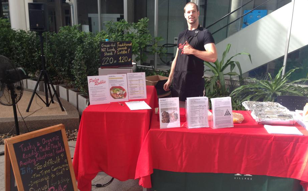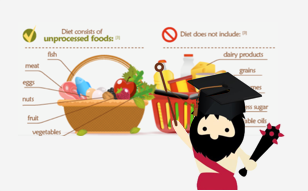At Paleo Robbie we are all about healthy living, and want all our followers to stick with their health and fitness goals.
To help you on your pilgrimage, we've come up with a list of 8 essential foods everyone living in Bangkok must have in their kitchen.
How many of these are in your kitchen right now?
1. Coconut water
How many times a week do you run into your apartment after spending any amount of time outside in the heat, and the first thing you do is turn on your air-con unit and head to the fridge for a refreshing drink?
While a bottle of cold water is a superb choice, there's something better for Bangkok expats... organic coconut water.

Not having coconut water in your kitchen when living in Bangkok should be a sin.
Coconut water contains electrolytes, calcium, magnesium and salts which replenish your body's lost nutriments after spending hours sweating in the Bangkok heat. While chopping up a fresh coconut is the best, it's always useful to have a bottle of raw coconut water for a quick drink.
- Paleo tip: Make sure you go for 100% organic coconut water and not coconut water with added sugar, water or preservatives. Just spend a few seconds reading the label to see if there are any other added ingredients.
2. Organic watermelons
Ever wondered why watermelons in Thailand taste so great? It's usually because they are injected with sugar, additives and other colourings. Watermelons in Thailand are one of our favorite fruits to snack on, but you need to know where it came from and what's really inside.
Watermelons are a wonderful addition to Thai kitchen because they are, just like coconuts, full of electrolytes which will help you prevent dehydration in the Bangkok heat. They are also cheap, full of vitamin A, B6, C and packed with lycopene, antioxidants and amino acids.
- Paleo tip: Adams Organic is a great place to get yourself organic, non-injected watermelons you can trust.
3. Wild-caught salmon (or any wild-caught fish)
Not a month goes by without allegations of the Thai fishing trade and what really goes on at sea.
Most nutrient-dense fish such as salmon and tuna cannot be sourced from the shores of Thailand and as a result is usually imported or farmed locally.
Which is better?
Without boring you with a few paragraphs on which is better and why, here's an awesome infographic showing you the difference between farm- and wild-caught salmon:
You should aim to eat at least 2 pieces of wild-caught fish per week, they are high in protein, and the good fats we don't get enough of like omega 3, which is good for your immune system and helps against heart disease.
4. Free-Range Pastured eggs
Free-range eggs cost more than their sad caged brothers, but what does free-range really mean and is it worth it?
There are 3 types of eggs you can typically buy in Bangkok, they are:
All eggs sold at Paleo Robbie are pasture-raised and 100% of their diet comes from natural foraging. We do not feed our chickens corn and when we say they are organic, we really mean it.
Don't be mislead by the term 'free-range' as these chickens are anything by free.
- Paleo tip: Even with all the sunlight we're exposed to, many expats in Bangkok have a vitamin D deficiency. Pasture-fed eggs are a good source of vitamin D and a great solution if you don't spend enough time in the baking heat.
5. Coconut cooking oil
Chances are you're using either coconut oil or olive oil for all your frying. If you're using canola, vegetable, or any other kind of oil, please stop for the sake of your own health... it's really not good for you. Coconut Oil and Olive Oil both have the same amount of calories, although coconut oil does have more saturated fat... but don't freak out, saturated fat is not bad for you.
 While we love olive oil, being in Thailand you should try to make use of the wonderful local coconuts. Coconut Oil might even be better for frying as it has a higher smoking point.
While we love olive oil, being in Thailand you should try to make use of the wonderful local coconuts. Coconut Oil might even be better for frying as it has a higher smoking point.
What is a smoking point?
In a nutshell, the smoking point is the level of heat needed for a blueish smoke to appear from the oil. At this point oxidation takes place and the oil is no longer good to cook with.
The smoking point shows the temperature limit at which the oil can be used. The smoking point for virgin olive oil is 160-190°C where coconut oil has a smoke point of 207°C.
Not a huge difference we know, but it can make a difference. Virgin coconut oil can also be used in coffee and other drinks to improve cognitive function.
6. Avocados
Avocado is the all purpose fruit. You can eat them straight out of the shell, spread it on food, blend it in a shake or turn into mash and enjoy it alongside some wild-caught salmon.
There are a few varieties of avocados you can get from Thailand. There's local Thai avocados, Burmese avocados and imported Avanza Avocados which we use in our Meal Plan.

Avocados contain more potassium than bananas are loaded with vitamin B5, B6, C, E K and folate. Avocados are also great if you're on a low carb diet as they are a great source of healthy fats.
- Paleo tip: the seed of an avocado contains 70% of all the antioxidants found inside. Instead of throwing them away, cut them into small pieces and add them to your next homemade fruit shake.
7. Grass-fed beef
We have some more bad news for you, it's not only watermelons that are injected with sugar, beef is too!
Glucose (simple sugar) is often added to different cuts of beef to make them taste sweeter. The only problem is that if they are directly injecting sugar into the meat, who knows what else they adding! When choosing between grain and or grass-fed beef, here's the difference between the two:
All our grass-fed beef is free of any injections and is 100% pure beef!
8. Leafy Greens (kale and spinach)
Buying kale or spinach back home may cost you an arm and a leg depending on where you shop, but in Thailand you can high-quality greens for a fraction of the price. You can use both to make healthy salads, green smoothies or eat them raw.
Kale has a little more protein and calcium, while spinach is packed full of iron and magnesium. Both are great sources of food and packed full of goodness. Are they in your fridge?
%2CFHy7PReubBc%3D.gif)
Summary
We easily could have added another 10, 20 or even an 100 food items to this list as Thailand is a country with lots of amazing produce, but for a balanced diet we feel the 8 power foods above are a must in every Bangkok kitchen.
If you plan on getting yourself into shape this year, here are 8 items you must place on your grocery list. Which must-have health foods do you have in your kitchen?





 Latest
Latest Newsletters
Newsletters Learn
Learn Recipes
Recipes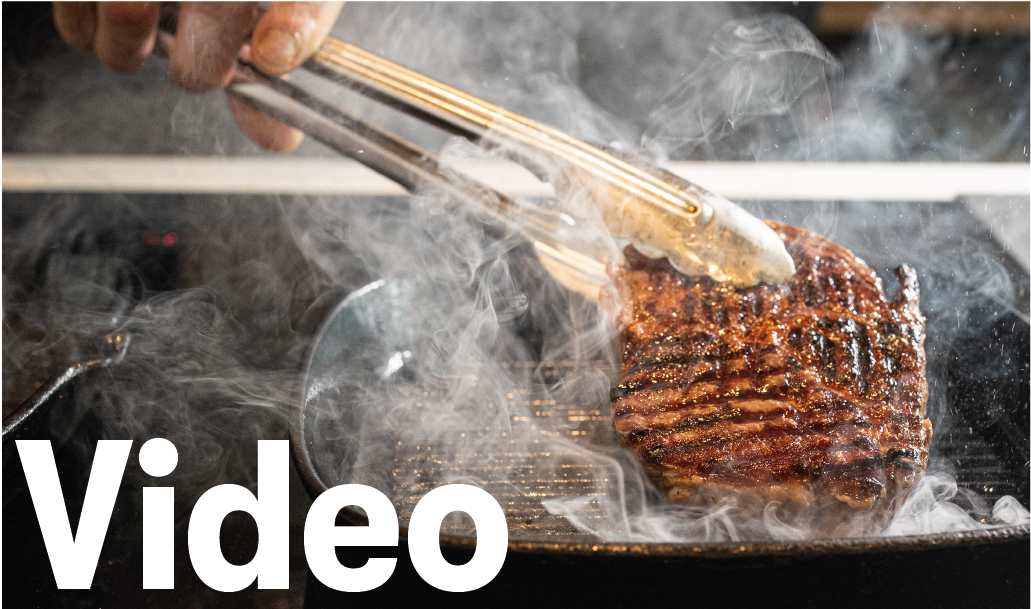 Video
Video